-
 bitcoin
bitcoin $87959.907984 USD
1.34% -
 ethereum
ethereum $2920.497338 USD
3.04% -
 tether
tether $0.999775 USD
0.00% -
 xrp
xrp $2.237324 USD
8.12% -
 bnb
bnb $860.243768 USD
0.90% -
 solana
solana $138.089498 USD
5.43% -
 usd-coin
usd-coin $0.999807 USD
0.01% -
 tron
tron $0.272801 USD
-1.53% -
 dogecoin
dogecoin $0.150904 USD
2.96% -
 cardano
cardano $0.421635 USD
1.97% -
 hyperliquid
hyperliquid $32.152445 USD
2.23% -
 bitcoin-cash
bitcoin-cash $533.301069 USD
-1.94% -
 chainlink
chainlink $12.953417 USD
2.68% -
 unus-sed-leo
unus-sed-leo $9.535951 USD
0.73% -
 zcash
zcash $521.483386 USD
-2.87%
How to use Ethereum API transactions? How to prevent errors in automatic order scripts?
Ethereum API transactions enable developers to interact with the blockchain, send Ether, deploy contracts, and execute functions, crucial for dApps and trading systems.
May 20, 2025 at 01:42 pm
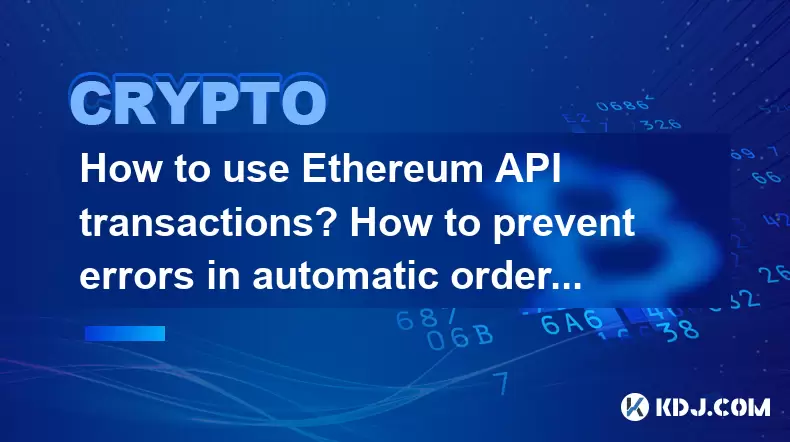
Ethereum API transactions play a crucial role in interacting with the Ethereum blockchain programmatically. They enable developers to send, receive, and monitor transactions, making them an essential tool for building decentralized applications (dApps) and automated trading systems. In this article, we will explore how to use Ethereum API transactions effectively and discuss strategies to prevent errors in automatic order scripts.
Understanding Ethereum API Transactions
Ethereum API transactions refer to the methods provided by Ethereum's JSON-RPC API that allow developers to interact with the Ethereum blockchain. These transactions can be used to send Ether (ETH), deploy smart contracts, and execute functions within smart contracts. To use these transactions, developers typically interact with Ethereum nodes or use services like Infura, which provide access to the Ethereum network.
To start using Ethereum API transactions, you need to have a basic understanding of JSON-RPC and how to send requests to an Ethereum node. Most Ethereum libraries, such as Web3.js for JavaScript or Web3.py for Python, provide abstractions over the JSON-RPC API, making it easier to send transactions and handle responses.
Sending a Transaction Using Ethereum API
Sending a transaction using the Ethereum API involves several steps. Here is a detailed guide on how to send a transaction using Web3.js:
Initialize the Web3 Provider: First, you need to connect to an Ethereum node or a service like Infura. You can do this by initializing a Web3 provider.
const Web3 = require('web3');const web3 = new Web3(new Web3.providers.HttpProvider('https://mainnet.infura.io/v3/YOUR_PROJECT_ID'));Set Up Your Account: You need an Ethereum account to send transactions. Ensure you have the private key of the account you want to use.
const account = web3.eth.accounts.privateKeyToAccount('YOUR_PRIVATE_KEY');web3.eth.accounts.wallet.add(account);Prepare Transaction Details: Define the details of the transaction, including the recipient's address, the amount of Ether to send, and the gas limit.
const tx = { from: account.address, to: 'RECIPIENT_ADDRESS', value: web3.utils.toWei('0.01', 'ether'), gas: '20000', gasPrice: web3.utils.toWei('20', 'gwei')};Send the Transaction: Use the
sendTransactionmethod to send the transaction. This method returns a promise that resolves to the transaction hash once the transaction is broadcasted to the network.web3.eth.sendTransaction(tx).then((txHash) => { console.log('Transaction Hash:', txHash);});
Monitoring Transaction Status
After sending a transaction, it's important to monitor its status to ensure it has been mined and executed successfully. You can use the getTransactionReceipt method to check the status of a transaction:
web3.eth.getTransactionReceipt(txHash).then((receipt) => { if (receipt && receipt.status) {
console.log('Transaction successful!');
} else {
console.log('Transaction failed or pending.');
}});
Preventing Errors in Automatic Order Scripts
Automatic order scripts are commonly used in trading bots and dApps to execute trades based on predefined conditions. However, these scripts can be prone to errors, which can result in financial losses. Here are some strategies to prevent errors in automatic order scripts:
Implementing Error Handling
Error handling is crucial in preventing unexpected issues from causing your script to fail. Here are some best practices for implementing error handling in your scripts:
Use Try-Catch Blocks: Wrap critical sections of your code in try-catch blocks to catch and handle exceptions gracefully.
try { // Critical code here} catch (error) { console.error('An error occurred:', error); // Handle the error appropriately}Log Errors: Ensure that all errors are logged to help with debugging and monitoring. Consider using a logging service to centralize error logs.
Implement Retry Logic: For transient errors, implement retry logic with exponential backoff to handle temporary network issues or high load on the Ethereum network.
async function retryWithBackoff(fn, maxRetries = 3, initialDelay = 1000) { let retries = 0; let delay = initialDelay;while (retries
try { return await fn(); } catch (error) { retries++; if (retries >= maxRetries) { throw error; } await new Promise(resolve => setTimeout(resolve, delay)); delay *= 2; }}}
// Usageawait retryWithBackoff(() => web3.eth.sendTransaction(tx));
Ensuring Sufficient Gas and Gas Price
Gas and gas price are critical factors in ensuring your transactions are processed successfully. Here's how you can ensure you have sufficient gas and set an appropriate gas price:
Estimate Gas: Use the
estimateGasmethod to estimate the amount of gas required for your transaction.web3.eth.estimateGas(tx).then((gasEstimate) => { tx.gas = gasEstimate;});Set Gas Price: Use the
getGasPricemethod to get the current recommended gas price and adjust it based on your needs.web3.eth.getGasPrice().then((gasPrice) => { tx.gasPrice = gasPrice;});
Handling Network Congestion
Network congestion can cause delays or failures in transaction processing. Here are some tips to handle network congestion:
Monitor Network Conditions: Use services like Etherscan to monitor the current network conditions and adjust your transaction settings accordingly.
Adjust Transaction Priority: Increase the gas price during periods of high congestion to prioritize your transactions.
Implement Queue Management: If you are sending multiple transactions, implement a queue management system to handle transactions in batches and adjust the timing based on network conditions.
Ensuring Correct Transaction Parameters
Correct transaction parameters are essential for the success of your transactions. Here's how you can ensure they are correct:
Validate Addresses: Always validate the recipient's address before sending a transaction to avoid sending funds to the wrong address.
if (!web3.utils.isAddress('RECIPIENT_ADDRESS')) { throw new Error('Invalid recipient address');}Check Balance: Ensure that the account sending the transaction has sufficient balance to cover the transaction amount and gas fees.
web3.eth.getBalance(account.address).then((balance) => { const totalCost = web3.utils.toBN(tx.value).add(web3.utils.toBN(tx.gas).mul(web3.utils.toBN(tx.gasPrice))); if (web3.utils.toBN(balance).lt(totalCost)) {throw new Error('Insufficient balance');}});
Use Nonce Management: Manage the nonce of your transactions to prevent issues with transaction ordering and replay attacks.
web3.eth.getTransactionCount(account.address).then((nonce) => { tx.nonce = nonce;});
FAQs
Q: Can I use Ethereum API transactions to interact with smart contracts?A: Yes, Ethereum API transactions can be used to interact with smart contracts. You can use methods like eth_call to execute read-only functions and eth_sendTransaction to execute state-changing functions on smart contracts.
A: To handle out-of-gas errors, you should estimate the gas required for your transaction using estimateGas and set a gas limit higher than the estimated value. Additionally, implement error handling to catch out-of-gas errors and retry the transaction with an increased gas limit if necessary.
A: Ethereum API transactions are specific to the Ethereum network. However, many other blockchain networks have similar APIs that allow you to interact with them. For example, Binance Smart Chain (BSC) has its own API that is similar to Ethereum's, but you would need to use a different provider and adjust your code accordingly.
Q: What are some common pitfalls to avoid when using Ethereum API transactions?A: Common pitfalls include not handling errors properly, not managing nonces correctly, setting insufficient gas limits, and not accounting for network congestion. Always ensure you have robust error handling, proper nonce management, and adaptive gas settings to avoid these issues.
Disclaimer:info@kdj.com
The information provided is not trading advice. kdj.com does not assume any responsibility for any investments made based on the information provided in this article. Cryptocurrencies are highly volatile and it is highly recommended that you invest with caution after thorough research!
If you believe that the content used on this website infringes your copyright, please contact us immediately (info@kdj.com) and we will delete it promptly.
- Chain Ecosystem Ignites: Latest Updates and XCN News Unveiling Dynamic Growth
- 2026-02-10 13:05:01
- MicroStrategy's Michael Saylor Doubles Down on Bitcoin Bet Amidst Market Turmoil
- 2026-02-10 12:40:03
- Digital Numismatics Takes Center Stage: Apps & AI Revolutionize Coin Collecting Software
- 2026-02-10 13:05:01
- XRP and Ripple Navigate Regulatory Currents: A Look Ahead
- 2026-02-10 13:00:02
- Altcoin Season Stalls: Key Metric Signals Market Stalemate Amid Bitcoin's Shifting Sands
- 2026-02-10 15:50:01
- Luna Classic (LUNC) Price Prediction: Navigating the $1 Dream Amidst Shifting Market Dynamics
- 2026-02-10 13:00:02
Related knowledge
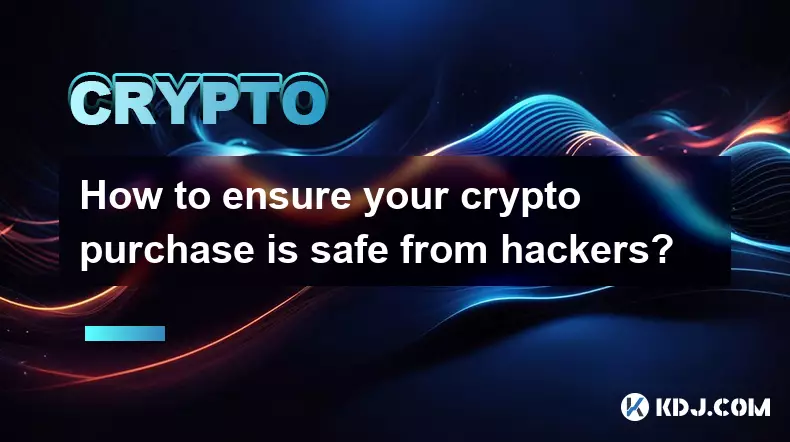
How to ensure your crypto purchase is safe from hackers?
Jan 28,2026 at 11:19pm
Secure Wallet Selection1. Choose hardware wallets for long-term holdings—devices like Ledger and Trezor isolate private keys from internet-connected s...
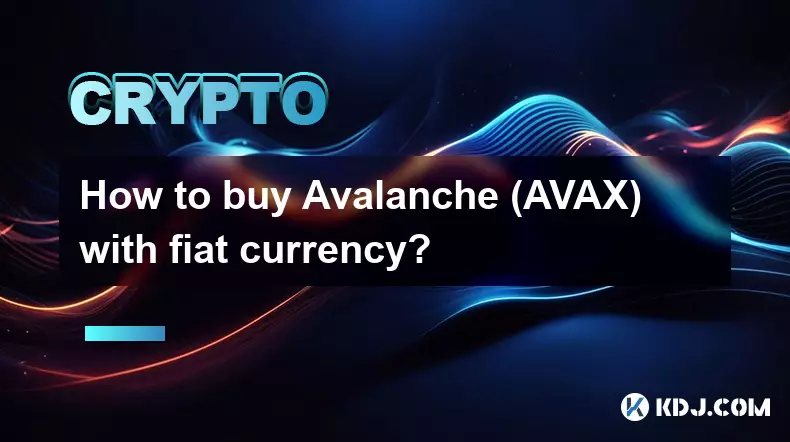
How to buy Avalanche (AVAX) with fiat currency?
Jan 29,2026 at 12:40pm
Choosing a Reliable Exchange Platform1. Identify exchanges licensed in your jurisdiction that support AVAX trading pairs with major fiat currencies li...
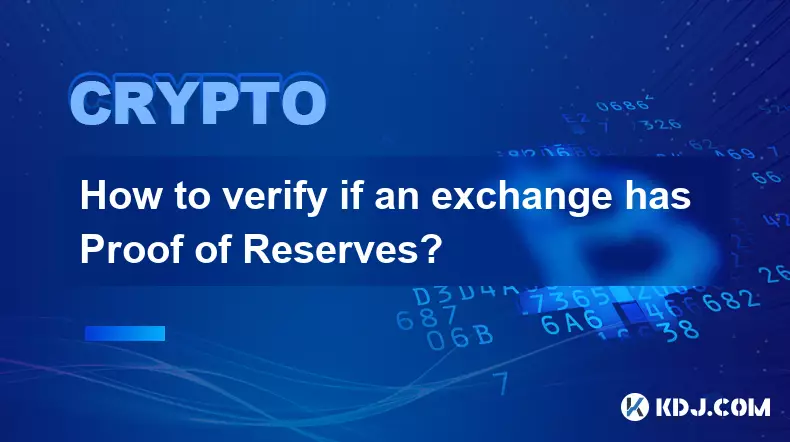
How to verify if an exchange has Proof of Reserves?
Jan 30,2026 at 06:39am
Understanding Proof of Reserves1. Proof of Reserves (PoR) is a cryptographic audit mechanism that demonstrates an exchange holds sufficient on-chain a...
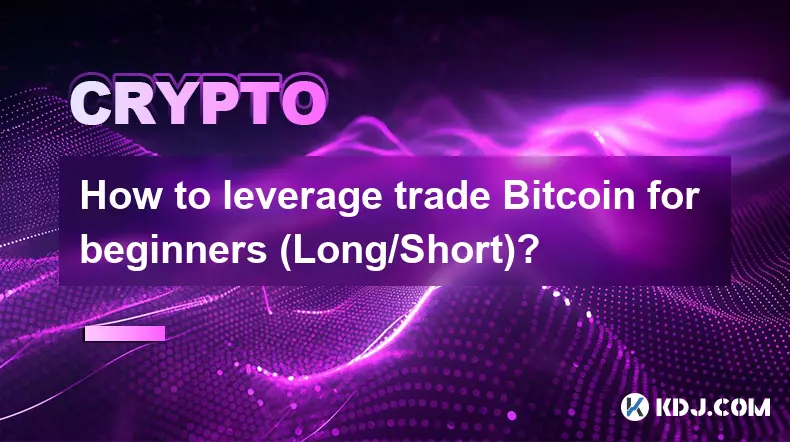
How to leverage trade Bitcoin for beginners (Long/Short)?
Jan 29,2026 at 03:19pm
Understanding Bitcoin Price Movements1. Bitcoin’s price is heavily influenced by macroeconomic indicators such as interest rate decisions, inflation d...
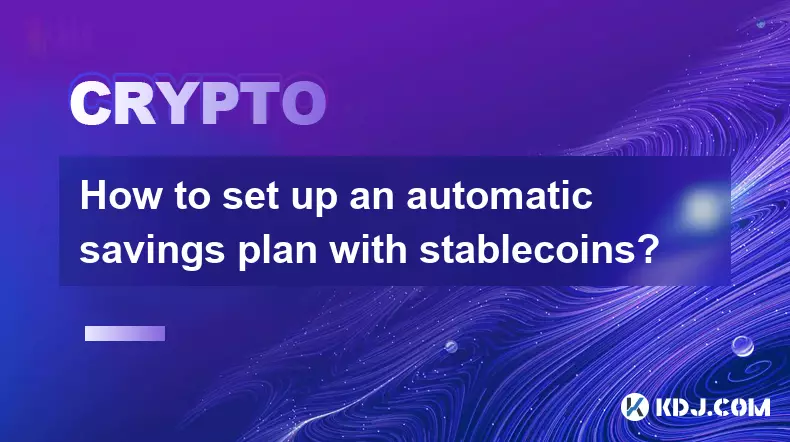
How to set up an automatic savings plan with stablecoins?
Jan 29,2026 at 06:39am
Understanding Stablecoin Savings Mechanics1. Stablecoins are digital assets pegged to fiat currencies like the US dollar, designed to minimize volatil...
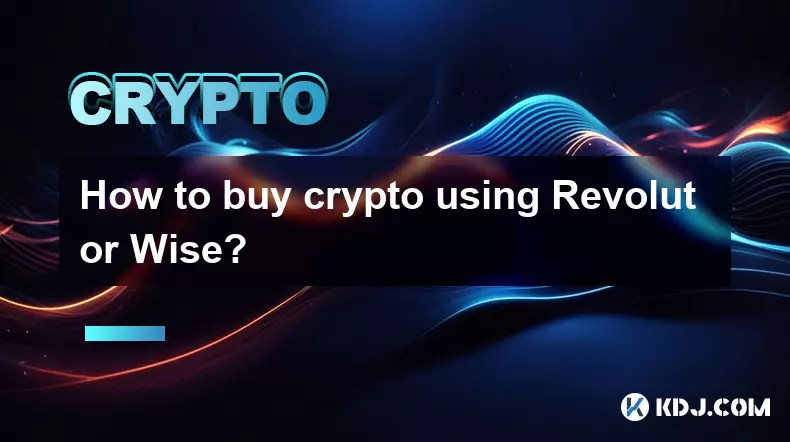
How to buy crypto using Revolut or Wise?
Jan 28,2026 at 11:00pm
Setting Up Your Revolut Account for Crypto Purchases1. Download the Revolut app and complete identity verification using government-issued ID and a se...

How to ensure your crypto purchase is safe from hackers?
Jan 28,2026 at 11:19pm
Secure Wallet Selection1. Choose hardware wallets for long-term holdings—devices like Ledger and Trezor isolate private keys from internet-connected s...

How to buy Avalanche (AVAX) with fiat currency?
Jan 29,2026 at 12:40pm
Choosing a Reliable Exchange Platform1. Identify exchanges licensed in your jurisdiction that support AVAX trading pairs with major fiat currencies li...

How to verify if an exchange has Proof of Reserves?
Jan 30,2026 at 06:39am
Understanding Proof of Reserves1. Proof of Reserves (PoR) is a cryptographic audit mechanism that demonstrates an exchange holds sufficient on-chain a...

How to leverage trade Bitcoin for beginners (Long/Short)?
Jan 29,2026 at 03:19pm
Understanding Bitcoin Price Movements1. Bitcoin’s price is heavily influenced by macroeconomic indicators such as interest rate decisions, inflation d...

How to set up an automatic savings plan with stablecoins?
Jan 29,2026 at 06:39am
Understanding Stablecoin Savings Mechanics1. Stablecoins are digital assets pegged to fiat currencies like the US dollar, designed to minimize volatil...

How to buy crypto using Revolut or Wise?
Jan 28,2026 at 11:00pm
Setting Up Your Revolut Account for Crypto Purchases1. Download the Revolut app and complete identity verification using government-issued ID and a se...
See all articles










































































